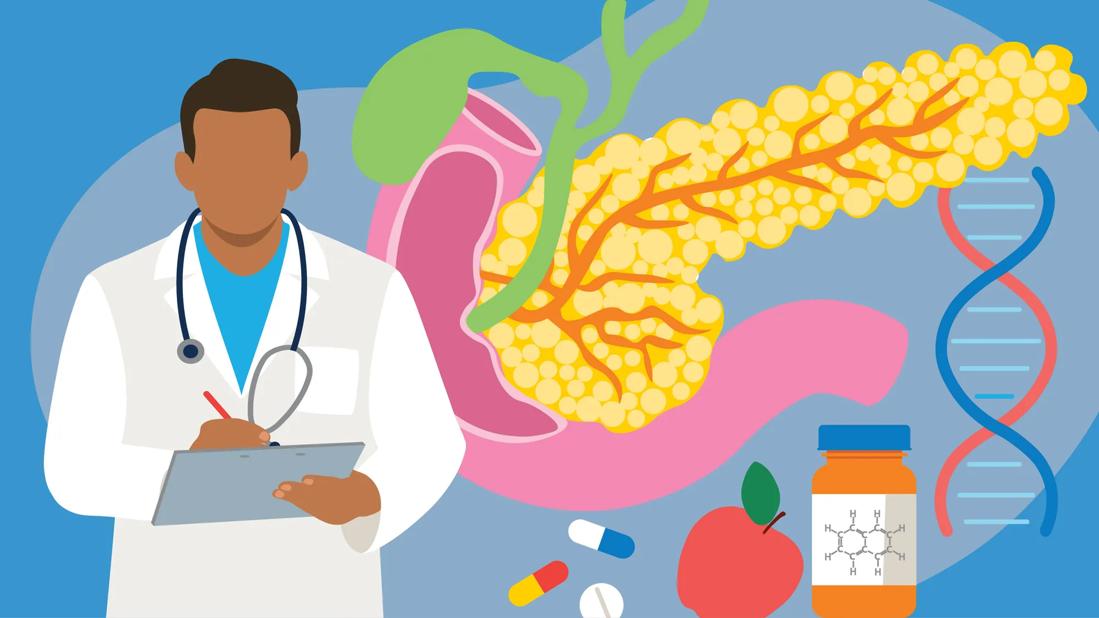Most of the risk factors aren’t things you can control, but making healthy lifestyle changes and managing other health conditions may help

Image content: This image is available to view online.
View image online (https://assets.clevelandclinic.org/transform/fc6417fe-86f0-4eeb-8289-deab54ba8767/pancreas-meds-diet-docs-1440818808)
Healthcare provider with clipboard and pen, with oversized pancreas, medicine, genetics
Pancreatic cancer is known to spread silently, with symptoms that don’t show up until the disease has already reached an advanced stage. That’s scary enough. But it’s compounded by the fact that there’s no definitive way to prevent this type of cancer.
Advertisement
Cleveland Clinic is a non-profit academic medical center. Advertising on our site helps support our mission. We do not endorse non-Cleveland Clinic products or services. Policy
“There aren’t many modifiable risk factors for pancreatic cancer,” says surgeon Robert Simon, MD. “That means there’s not much you can change about your life or your habits to help lower your risk of getting this type of cancer.” But Dr. Simon adds that there are some steps that you can take that may help.
Most of the main risk factors for pancreatic cancer are beyond your control — like age, race, sex and other genetic factors. But these proactive approaches may help.
Healthy habits like eating whole foods and exercising help lower your overall risk of cancer in general. And a few habits may help reduce your risk of pancreatic cancer in particular.
Advertisement
These lifestyle changes can be hard to make, even when you really want to make them stick. So, if you find that you can’t do it alone, don’t hesitate to ask your healthcare provider for help.
“They have access to a variety of resources that can support your efforts to quit smoking, scale back your drinking and change your diet,” Dr. Simon encourages.
Some other conditions raise your risk of developing pancreatic cancer, so it’s important to try to keep them in check.
In some cases, making lifestyle changes can ward off these conditions. But you can work with your healthcare provider to manage and modify them when they do occur.
In some cases, undergoing genetic testing can provide important insight into your risk of pancreatic cancer by revealing inherited syndromes that raise your risk.
“It’s important to recognize that screening is not recommended for adults who are asymptomatic and have an average risk — which is the vast majority of people,” Dr. Simon emphasizes.
But your provider may recommend testing if you know your biological family health history and it includes:
Still, having a genetic predisposition to pancreatic cancer doesn’t mean it’s a given that you’ll develop it, too. Former U.S. President Jimmy Carter’s family lost his father and three siblings to the disease — but he never developed it himself.
“Pancreatic cancer doesn’t have as many warning signs as other cancers,” Dr. Simon reiterates. “It’s challenging to identify it early.”
Advertisement
The most common symptoms all occur in the later stages of the disease. So, it’s critical to see a healthcare provider ASAP if you notice symptoms.
“The most common single symptom of pancreatic cancer is jaundice, which causes a yellowing of the skin and eyes along with skin itchiness,” he continues. “But you’ll actually first notice that it turns your urine a very dark color.”
Other symptoms include:
“If you experience these symptoms, see your doctor promptly so you can be evaluated,” Dr. Simon urges.
For a variety of reasons, it’s still very difficult to detect pancreatic cancer in its early stages. There’s no go-to screening that can catch it early — for example, like mammograms can do for breast cancer or colonoscopies can do for colon cancer.
“Researchers are working to find better ways to identify pancreatic cancer at a point when treatment can be most effective,” Dr. Simon says. “Advances in treatment continue to evolve, too.”
It’s natural to feel uneasy when you consider the possibility of developing a disease with so many unknowns. But scientific progress is being made every day.
In the meantime, focusing on what you can do — from managing your personal health to seeking care when something feels off — is a practical place to start.
Advertisement
Advertisement

Sign up for our Health Essentials emails for expert guidance on nutrition, fitness, sleep, skin care and more.
Learn more about our editorial process.
Advertisement
Research consistently shows that soy-based foods do not increase your risk of breast cancer
Lung cancer and treatment can take its toll, but support is available to help you live well
Getting your treatment plan just right can take some fine-tuning, but the appointments will taper off
Side effects like nausea and fatigue are common, but there are ways to feel better
Any fever, especially one of 100.5 degrees Fahrenheit or higher, should trigger a call to your oncologist — and maybe a trip to the ER
People with sickle cell trait have one copy of an abnormal gene — people with the disease have two
Smoking can make symptoms from cancer treatment worse, and can even make treatments less effective
Frequent burping can be many things — but likely not cancer
Although it could be used as a moisturizer, this new trend is not recommended
Communicating clear limits helps protect your time, energy and emotional well-being
High cholesterol can be genetic, but testing and treatment can lower your heart disease risk